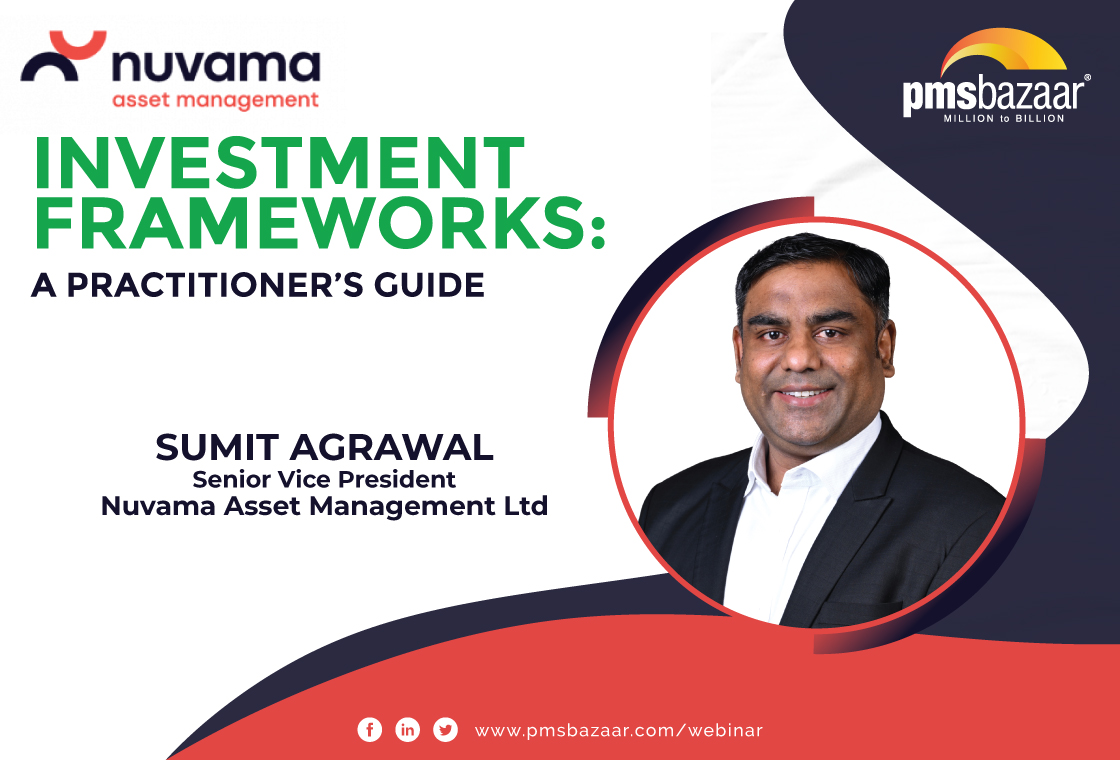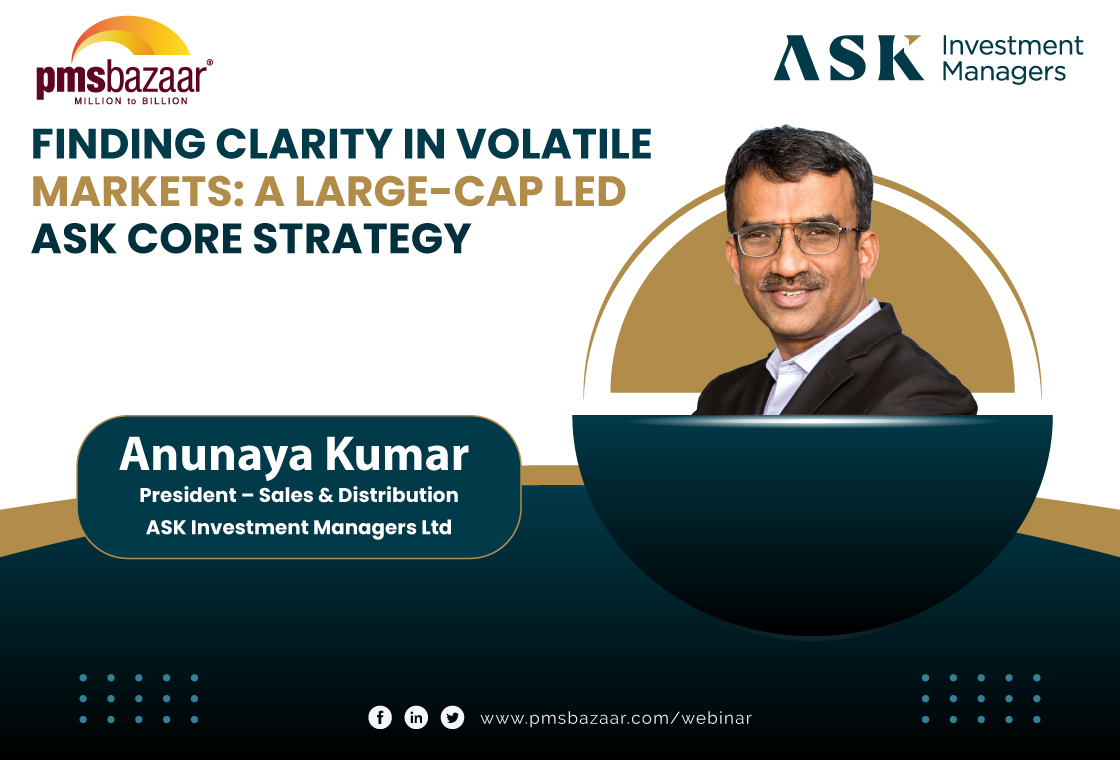PMS Bazaar recently organized a webinar titled “How to Boost Your Portfolio with Private Equity Fund of Funds”

Which featured Ms. Shashi Singh, Head of Business, Singularity AMC. This blog covers the important points shared in this insightful webinar.
The webinar blog covers insights from Ms. Singh, which includes Private equity Fund of Funds, highlighting challenges for retail investors, high ticket sizes, the inclusive Fund of Funds model, Singularity's unique strategy, allocation to secondaries and co-investments, expected IRR of 18–22%, taxation, NRI access, market trends, exit strategies beyond IPOs, and Singularity’s team expertise and network advantages.
Key aspects covered in this webinar blog are
- The exclusionary barrier: High ticket sizes and limited access
- The fund of funds model: A pathway to inclusive participation
- Singularity: A legacy of expertise and strategic vision
- Singularity Fund of Fund 2: A distinctive value proposition and strategic allocation
- Secondaries and co-investments: Enhancing returns and optimizing tenure
- Investment portfolio and performance: A track record of success and diversification
- Expected returns and market outlook: Navigating volatility and capitalizing on opportunities
- The advantage of expertise and network: Access and analysis
- Investor accessibility and taxation: Addressing NRI and US investor queries
- Exit strategy and market dynamics: Beyond IPOs
Summary: Ms. Shashi Singh highlighted the challenges retail investors face in accessing India's private equity market due to higher ticket sizes. She championed Singularity's Fund of Funds 2, offering access to exclusive funds through a diversified portfolio of primary investments, secondaries, and co-investments. Singularity leverages its team's expertise and network for optimal returns, targeting 18-22% IRR. They clarified investment accessibility for NRIs and US investors, taxation, and diverse exit strategies beyond IPOs. Singh emphasized private equity's potential for high-growth businesses.
Ms. Shashi Singh started by shedding light on the intricate dynamics of the Indian private equity market, particularly concerning the accessibility for retail investors. She articulated the significant growth witnessed in this sector over the past decade, highlighting the substantial returns generated by investments in unlisted companies. However, she emphasized a crucial disparity: the principal beneficiaries of this growth have been large institutional investors, both domestic and foreign, and affluent family offices, leaving a significant gap for the average investor.
The Exclusionary Barrier: High Ticket Sizes and Limited Access
A fundamental challenge, as Ms. Singh explained, lies in the prohibitive ticket sizes demanded by most reputable private equity funds. These funds, generally structured as Category 2 Alternative Investment Funds (AIFs), often necessitate a minimum investment of 1 crore, with many premium funds setting the threshold even higher, at 3 to 5 crores. This financial barrier effectively excludes the average investor from participating in and diversifying across a portfolio of private equity opportunities, limiting their access to potentially high-growth investments.
The Fund of Funds Model: A Pathway to Inclusive Participation
In response to this accessibility challenge, Ms. Singh championed the fund of funds model as a vital instrument for retail investors to participate in the private equity market. This approach aggregates capital from multiple investors, enabling them to collectively invest in Multiple funds that would otherwise be beyond their financial reach. The fund of funds strategy facilitates greater diversification, mitigating risk and maximizing potential returns, even with relatively smaller capital outlays.
Singularity: A Legacy of Expertise and Strategic Vision
Ms. Singh then introduced Singularity, a six-year-old firm that benefits from the seasoned leadership of Mr. Madhusudan Kela, a distinguished figure in the Indian capital markets. She mentioned that Singularity meticulously invested its proprietary capital, rigorously testing its investment thesis in the private sector. This period of internal validation ensured that the firm's strategies were robust and aligned with its long-term objectives. Once the thesis was validated, Singularity launched funds for external clients.
Singularity Fund of Fund Series 2: A Distinctive Value Proposition and Strategic Allocation
Ms. Singh emphasized that Singularity Fund of Fund 2 adopts a unique approach that distinguishes it from other funds of funds in the market. Rather than claiming to identify the absolute best funds across the board, Singularity focuses on providing access to high-quality, boutique funds that are typically inaccessible to retail investors due to their high investment thresholds or institutional focus.
The fund aims to construct a comprehensive private equity portfolio within a single investment vehicle. It allocates 40-50% of its capital to these exclusive private equity funds, while the remaining capital is strategically deployed in secondaries and co-investments. This dual approach offers investors exposure to a diverse range of funds and direct deal investments, optimizing risk-adjusted returns.
Secondaries and Co-investments: Enhancing Returns and Optimizing Tenure
Ms. Singh elaborated on the benefits of secondaries and co-investments. Co-investments allow investors to directly participate in private equity companies alongside the fund, providing access to potentially high-growth opportunities. Secondaries, on the other hand, involve purchasing existing fund units or company shares, often at a discount. This strategy not only reduces the investment tenure but also enhances potential returns by capitalizing on discounted entry points. The purchase of secondary units, for example, allows for a shorter holding period than a traditional private equity investment, often 2-3 years as opposed to 7-8 years.
Investment Portfolio and Performance: A Track Record of Success and Diversification
Ms. Singh provided examples of funds in which Singularity has invested. These funds offer exposure to diverse sectors and growth opportunities. Ms. Singh also highlighted the potential for co-investment opportunities in companies that these funds have backed. She outlined the strategy of investing in funds with varying stages of maturity, emphasizing the importance of a well-balanced portfolio. Early-stage funds, growth-stage funds, and late-stage funds all play a role in the overall performance of the Fund of Fund Series 2. The team at Singularity carefully analyses each potential fund, seeking those with the strongest potential for returns.
Expected Returns and Market Outlook: Navigating Volatility and Capitalizing on Opportunities
Ms. Singh indicated that investors can expect drawdowns over a 3.5 to 4.5-year period, with returns expected from the fifth year onwards. The fund targets a gross IRR of 18-22%. She also provided insights into the current market dynamics, noting that private and listed markets often move in opposite directions. While listed markets have experienced significant corrections, the private market has seen more realistic valuations, creating Favorable investment opportunities.
She emphasized that private equity offers access to high-growth, new-age businesses that are not readily available in the listed markets. She believes that every investor should allocate 15-25% of their portfolio to private equity, depending on their risk appetite.
The Advantage of Expertise and Network: Access and Analysis
Ms. Singh emphasized the importance of Singularity's experienced team and their extensive network. In the private equity space, access to deals is crucial. Singularity's 24-member investment team has a deep network, allowing them to identify and secure the best transactions, both in fund selection and co-investment opportunities.
Furthermore, the team's expertise in both capital markets and business analysis allows them to accurately assess the potential of unlisted companies. They understand how capital markets will view these companies upon listing, and they can effectively navigate the valuation process. This dual expertise is a significant asset for Singularity and its investors.
Investor Accessibility and Taxation: Addressing NRI and US Investor Queries
In response to inquiries from NRI investors, Ms. Singh confirmed that they can directly invest in Singularity's AIF through their NRE accounts, provided the funds are fully repatriable. She clarified that while Singularity welcomes investments from US investors, they do not offer a GIFT City feeder fund for this particular fund of funds, as it is designed to invest in other funds.
Regarding taxation, Ms. Singh explained that the fund operates on a pass-through taxation model. This means that capital gains, whether long-term or short-term, are not deducted at the fund level but are taxed at the investor level. Singularity will provide investors with detailed tax statements to facilitate their tax reporting.
Exit Strategy and Market Dynamics: Beyond IPOs
Ms. Singh then addressed questions about Singularity's exit strategy, particularly in light of the current cooling-off period in the IPO market. She clarified that while 40-50% of the fund is invested in other funds and relies on the exit strategies of those underlying funds, Singularity's team also considers various exit avenues like IPO, Selling to Strategic’s etc., for their direct investments.
Ms. Singh covered all the topics mentioned above in-depth and answered questions from the audience towards the end of the session. For more such insights on this webinar, watch the recording of this insightful session through the appended link below.
Get access to rich data and analytics of PMS & AIF by subscribing to us. Join the 75000+ investors & experts: Subscribe NOW
Recent Blogs

January Rout, Extreme Dispersion: PMS Returns Swing From Losses to Gains
Benchmark falls deepened losses, but multi-asset and debt cushioned portfolios meaningfully

Investment Frameworks : A Practitioner’s Guide
PMS Bazaar recently organized a webinar titled “Investment Frameworks: A Practitioner’s Guide,” which featured Mr. Sumit Agrawal, Senior Vice President, Nuvama Asset Management Limited. This blog covers the important points shared in this insightful webinar.

Aurum Multiplier Portfolio - Where Small and Mid-Cap Alpha Meets Large-Cap Stability
PMS Bazaar recently organized a webinar titled “Aurum Multiplier Portfolio - Where Small and Mid-Cap Alpha Meets Large-Cap Stability,” which featured Mr. Sandeep Daga, MD& CIO, Nine Rivers Capital and Mr. Kunal Sabnis, Portfolio Manager, Nine Rivers Capital. This blog covers the important points shared in this insightful webinar.

Flat Markets, Wide Outcomes: How 484 PMS Strategies Performed in Dec 2025
December 2025 was a month where market returns stayed close to flat, with the Nifty 50 TRI at -0.28% and the BSE 500 TRI at -0.24%.

Equity Markets 2026: Outlook, Risks and Strategy
PMS Bazaar recently organized a webinar titled “Equity Markets 2026: Outlook, Risks and Strategy,” which featured Mr. Ashish Chaturmohta, MD & Fund Manager – APEX PMS, JM Financial Limited. This blog covers the important points shared in this insightful webinar.

MICRO CAPS: The Dark Horses of the Indian Equity Market
PMS Bazaar recently organized a webinar titled “MICRO CAPS: The Dark Horses of the Indian Equity Market,” which featured Mr. Rishi Agarwal and Mr. Adheesh Kabra, both Co-Founders and Fund Managers, Aarth AIF. This blog covers the important points shared in this insightful webinar.

Finding Clarity in Volatile Markets: A Large-Cap Led ASK CORE Strategy
PMS Bazaar recently organized a webinar titled “Finding Clarity in Volatile Markets: A Large-Cap Led ASK CORE Strategy,” which featured Mr.Anunaya Kumar, President – Sales and Distribution ASK Investment Managers Limited. This blog covers the important points shared in this insightful webinar.
.jpg)
Passively Active Investing — A Modern Investor’s Lens on ETF-Based PMS
PMS Bazaar recently organized a webinar titled “Passively Active Investing — A Modern Investor’s Lens on ETF-Based PMS,” which featured Mr. Karan Bhatia, Co-Founder and Co-Fund Manager , Pricebridge Honeycomb ETF PMs. This blog covers the important points shared in this insightful webinar.

